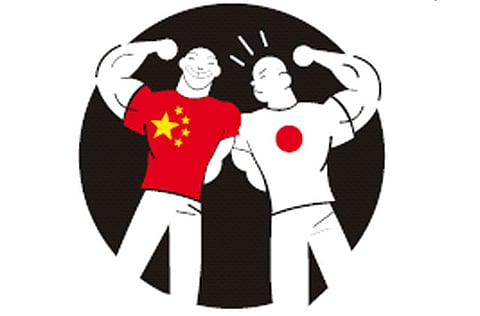The struggle for mastery of the Pacific
Unless China makes an effort to be more transparent, its neighbours will continue to be suspicious about its aims

On May 1 the Shanghai Expo began, illuminated by a huge fireworks display. The festivities will continue until the end of October. In 1970, Japan celebrated its own tremendous postwar economic growth with the Osaka Expo, as well as by launching the Bullet Train. The world watches and wonders whether China will follow Japan's path and emerge as a fully modern yet peacefully inclined country.
There are reasons to doubt that it will. China's willingness to demonstrate its new might is not confined to land; on the contrary, China's maritime ambitions have no end in sight. Indeed, when Admiral Timothy J. Keating, the commander of the United States Navy's Pacific fleet, visited China in 2007, a high-ranking Chinese naval officer proposed that the two countries demarcate a "zone of control" at Hawaii, defining the limits of US naval influence and the beginning of China's maritime sphere. The Chinese navy, it is now believed, is trying to achieve that very aim.
China's ambition is marked by muscle flexing. On April 8, a helicopter from a Chinese naval vessel operating in international waters south of Okinawa came within 90 metres of a Japanese Self-Defence Force escort ship — so close that a gun-wielding Chinese soldier was clearly visible. Japan protested, describing the incident as an "extremely dangerous act".
Repeated provocation
As if demonstrating its intention to ignore the protest, on April 21 Chinese Navy vessels sailed northward, between Okinawa and the Miyako islands, and conducted a large-scale exercise. Once again, a Chinese military helicopter circled a Japanese escort ship.
The Japanese and Chinese militaries do not have close ties. To prevent an accident from inciting a volatile incident, it is imperative that the two sides develop a deeper bilateral military dialogue.
Nothing of the sort is happening. Moreover, Japan's government has encouraged Chinese regional ambitions by embracing an anti-American attitude similar to the administration of South Korea's former president, Roh Moo-hyun. By promising in last summer's election campaign to expel America's bases on Okinawa, Prime Minister Yukio Hatoyama put himself in a bind. It now appears that he wants to backtrack on his promise, but massive protests are inhibiting him from doing so.
Sensing a widening gulf between Japan and the US, the Chinese Navy is demonstrating its growing might in the seas around Japan — and asserting its aspiration to replace the US as the Pacific's dominant naval power.
The Chinese Navy is not only eyeing the Pacific, but also steering toward South Asia, the Indian Ocean, the Middle East, and Africa. Indeed, the growing contest between India and China is not only military in nature, but also concerns the acquisition of natural resources. By controlling the sea lanes, China hopes to gain leverage over India's capacity for economic growth.
Chinese military expansion has seen double-digit annual growth for 22 years. Although Chinese officials say that the 2010 military budget has been restrained, and will grow by only 7.5 per cent, China's military expenditures already exceed those of Japan by 15 per cent. In fact, China probably limited the increase this year after recognising that the international community is becoming alarmed by the steep upward trajectory of its military build-up.
But there remain doubts about the true level of China's military spending, owing to a pronounced lack of transparency in the budget process. It remains unclear, for example, whether the research and development costs for an aircraft carrier are included.
China claims that it is entitled to play a role in setting the rules that govern the international system. China should, of course, play such a part. But until China acts with greater sincerity and transparency in eliminating the international community's concerns, it runs the risk that its neighbours will not only suspect its efforts in the international arena, but take active countermeasures to defend their security.
— Project Syndicate, 2010
Yuriko Koike, a former Japanese minister of defence and national security adviser, is a member of the opposition in Japan's Diet.



